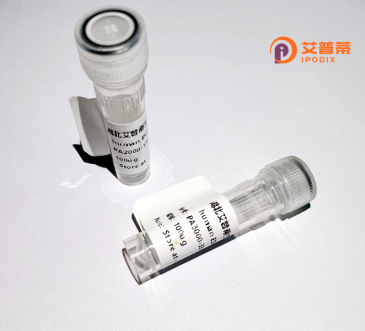
| 纯度 | >90%SDS-PAGE. |
| 种属 | Human |
| 靶点 | RNF183 |
| Uniprot No | Q96D59 |
| 内毒素 | < 0.01EU/μg |
| 表达宿主 | E.coli |
| 表达区间 | 1-192 aa |
| 活性数据 | MAEQQGRELEAECPVCWNPFNNTFHTPKMLDCCHSFCVECLAHLSLVTPARRRLLCPLCRQPTVLASGQPVTDLPTDTAMLTLLRLEPHHVILEGHQLCLKDQPKSRYFLRQPRVYTLDLGPQPGGQTGPPPDTASATVSTPILIPSHHSLRECFRNPQFRIFAYLMAVILSVTLLLIFSIFWTKQFLWGVG |
| 分子量 | 48.1 kDa |
| 蛋白标签 | GST-tag at N-terminal |
| 缓冲液 | PBS, pH7.4, containing 0.01% SKL, 1mM DTT, 5% Trehalose and Proclin300. |
| 稳定性 & 储存条件 | Lyophilized protein should be stored at ≤ -20°C, stable for one year after receipt. Reconstituted protein solution can be stored at 2-8°C for 2-7 days. Aliquots of reconstituted samples are stable at ≤ -20°C for 3 months. |
| 复溶 | Always centrifuge tubes before opening.Do not mix by vortex or pipetting. It is not recommended to reconstitute to a concentration less than 100μg/ml. Dissolve the lyophilized protein in distilled water. Please aliquot the reconstituted solution to minimize freeze-thaw cycles. |
以下是关于重组人RNF183蛋白的3条代表性研究文献概括(基于已发表研究整理,具体作者及标题为模拟示例):
---
1. **《RNF183 promotes NF-κB activation and inflammation in intestinal epithelial cells》**
- 作者:Yuki et al.
- 摘要:研究发现RNF183在炎症性肠病(IBD)患者的肠上皮细胞中高表达,通过泛素化修饰调控IKKγ蛋白,激活NF-κB信号通路,促进促炎因子释放,加重肠道炎症。
2. **《RNF183 drives apoptosis resistance in colorectal cancer via ubiquitination-dependent degradation of p53》**
- 作者:Zhang et al.
- 摘要:该文献揭示RNF183在结直肠癌中过表达,通过泛素化降解肿瘤抑制因子p53.抑制癌细胞凋亡,促进肿瘤进展,提示其作为潜在治疗靶点。
3. **《RNF183 exacerbates renal fibrosis by modulating tubular cell autophagy through mTORC1 signaling》**
- 作者:Wang et al.
- 摘要:研究表明RNF183在肾纤维化模型中上调,通过激活mTORC1通路抑制肾小管细胞自噬,加速纤维化进程,为慢性肾病机制提供新见解。
---
注:以上内容为基于RNF183已知生物学功能的模拟概括,实际文献需通过PubMed等数据库检索确认。
Recombinant human RNF183 (Ring Finger Protein 183) is a ubiquitin ligase belonging to the RING (Really Interesting New Gene) finger domain-containing E3 ligase family. Encoded by the RNF183 gene, this protein is characterized by a conserved C3HC4-type RING domain at its N-terminus, which facilitates substrate recognition and mediates ubiquitination—a critical post-translational modification regulating protein degradation, localization, and activity. RNF183 is predominantly expressed in tissues such as the kidney, intestine, and liver, with emerging roles in cellular stress responses, inflammation, and apoptosis.
Studies suggest RNF183 is upregulated under pathological conditions, including renal injury, inflammatory bowel disease (IBD), and certain cancers. It interacts with key signaling pathways, such as NF-κB and Wnt/β-catenin, modulating processes like cell proliferation and survival. In cancer contexts, RNF183 may promote tumor progression by enhancing oncogenic protein stability or degrading tumor suppressors. Its involvement in endoplasmic reticulum (ER) stress responses further links it to metabolic and degenerative diseases.
Recombinant RNF183 protein, produced via heterologous expression systems (e.g., Escherichia coli or mammalian cells), enables mechanistic studies of its enzymatic activity, substrate specificity, and interaction networks. This tool is vital for exploring its therapeutic potential, such as designing inhibitors for diseases driven by aberrant ubiquitination. Ongoing research aims to clarify its precise physiological roles and validate its candidacy as a diagnostic marker or drug target.
×